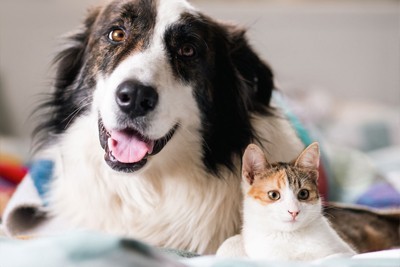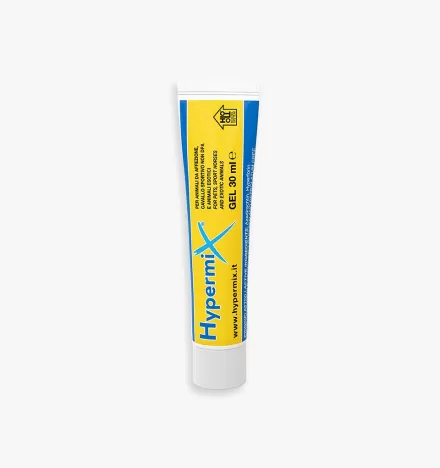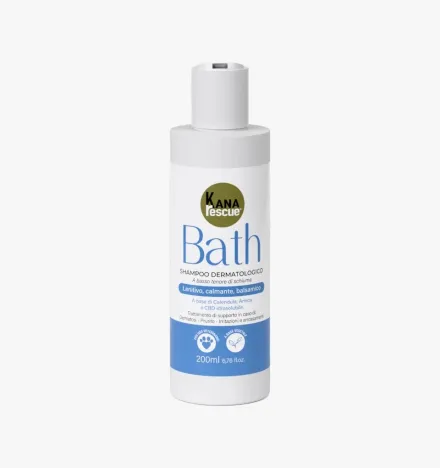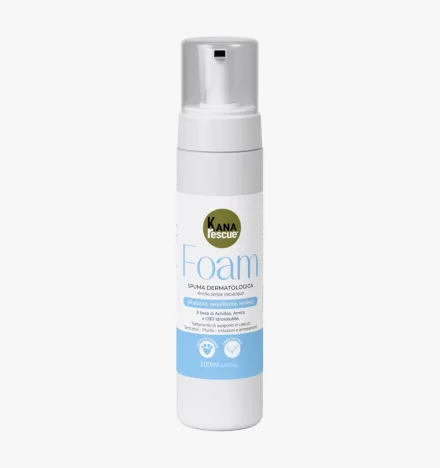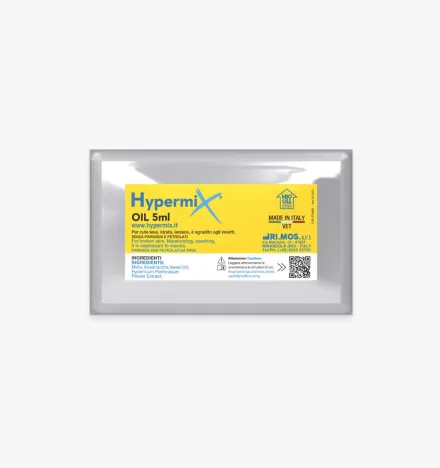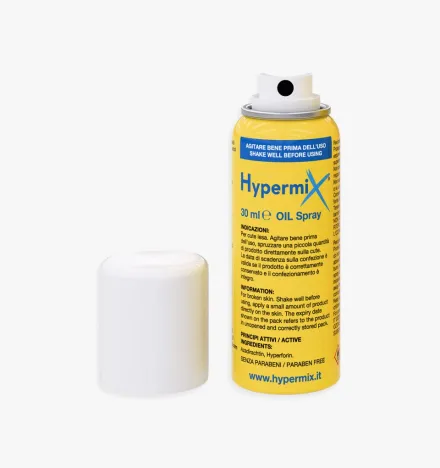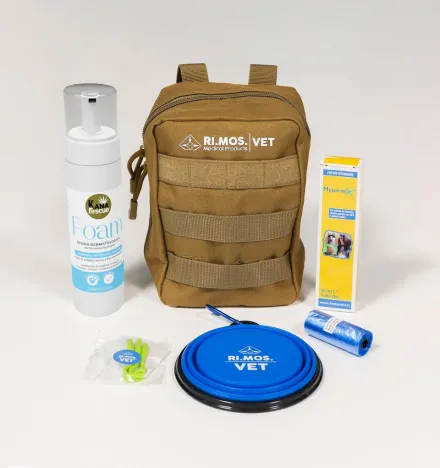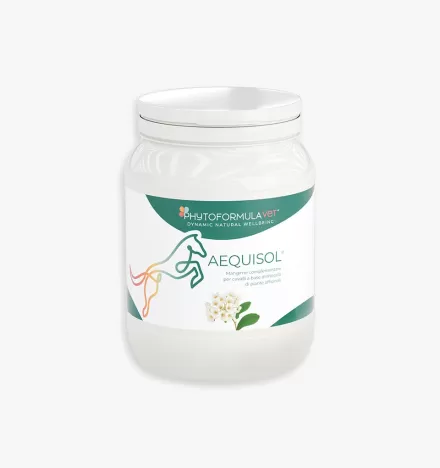Skin problems in animals: everything you need to know
Skin problems in animals can range from mild, transient conditions to more complex conditions requiring specific interventions. Understanding the symptoms, causes, and available treatment options is critical to ensuring the animal's well-being.
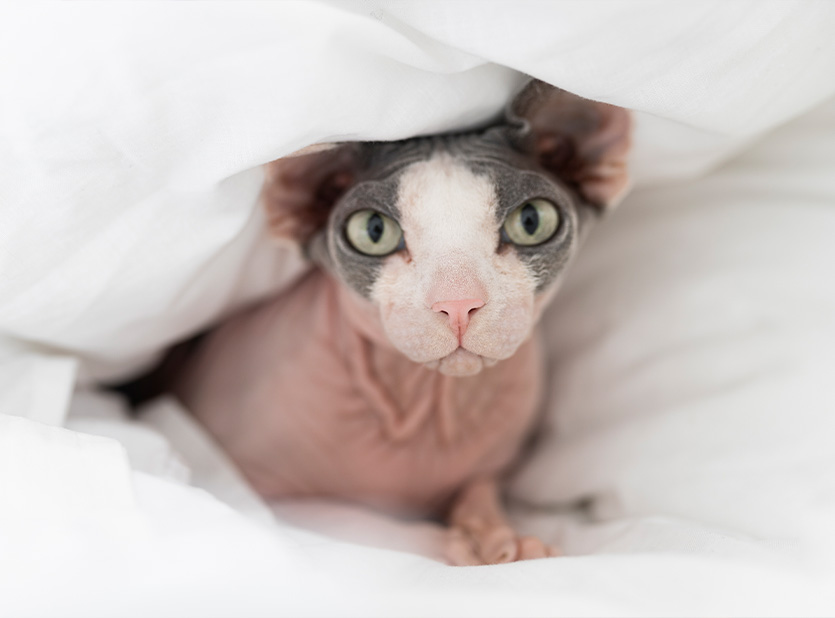
SKIN PROBLEMS: RECOGNIZING THEM, TREATING THEM, PREVENTING THEM
While animals' skin is an essential barrier to their health, it can be susceptible to many issues, including irritation, trauma, infection and allergic reactions. There can be a variety of causes, so acting on early signs of a skin issue and consulting a veterinarian for a thorough checkup is the most effective way to promote complete healing and improve the pet's quality of life.
WHAT IS MEANT BY SKIN PROBLEMS?
Skin problems in animals constitute a broad category of disorders involving the skin, the body's largest protective organ. These disorders manifest themselves with varying symptoms such as itching, redness, swelling, wounds, scaling or loss of hair that, if neglected, can compromise the animal's overall well-being.
In many cases, skin problems reflect an alteration in the delicate balance of the skin, which plays a key role not only as a physical barrier but also as an immune regulator. These problems can arise suddenly or develop over time, influenced by local or systemic factors.
Recognizing skin problems at an early stage is essential to avoid complications. Even seemingly mild symptoms, such as mild redness or intermittent itching, can evolve into more serious situations if not treated properly. In addition, many skin conditions may be indicative of deeper internal issues, necessitating a comprehensive evaluation of the animal's health status.
Types of skin problems
Skin problems in animals include a wide range of disorders that can affect domestic animals (such as dogs, cats, rabbits, rodents), exotic animals (such as rabbits, rodents, birds, and reptiles), farm animals (cattle, sheep, pigs), and wild animals.
Indeed, the skin can be affected by infectious, parasitic, allergic, or autoimmune diseases.
Dermatitis
Dermatitis is inflammation of the skin found in many animal species, with varying causes and manifestations:
- Atopic dermatitis: is triggered by environmental allergens such as pollen, dust or mold and food intolerances. It manifests with persistent itching, hair loss and secondary infections.
- Contact dermatitis: is triggered by skin contact with chemical or natural substances that act as allergens that can stimulate an immune response causing an inflammatory reaction and intense itching.
- Stress dermatitis: susceptible animals affected by this form of dermatitis scratch intensely to the point of self-injury, shaping inflammatory skin phenomena of varying degrees.
- Parasitic dermatitis: caused by fleas, lice, mites and ticks, manifested by licking, scratching due to intense itching, evolving into hair loss, inflammation, redness, skin erosions, and if left untreated into skin thickening.
- Leishmaniasis-associated dermatitis: this is a common manifestation in dogs with leishmaniasis, a parasitic disease transmitted by phlebotomus. It presents with hair loss, scaling, thickening of the skin, and sometimes ulcerative lesions. Management requires specific treatment prescribed by the veterinarian to counteract the underlying disease.
Dermatosis
Dermatoses encompass a wide range of skin disorders that are not always associated with inflammatory processes but can compromise the health and well-being of animals. These conditions occur in many species, including dogs, cats, horses, exotic animals, and farm animals, with varying causes and symptoms:
- Hereditary dermatoses: some animals may be predisposed to genetically determined skin diseases. In dogs, for example, primary seborrhea is a hereditary dermatosis that presents with oily skin, scales and unpleasant odor. In horses, some breeds have a greater predisposition to skin hypersensitivity.
- Toxic dermatoses: exposure to irritating chemicals, toxic plants or drugs that can cause severe skin reactions.
Dermatoses, often chronic, require a thorough diagnosis to identify the underlying cause and tailor treatment. Management may include dietary changes, topical and systemic treatments, or removal of triggers.
Mycosis from fungal infections
Fungal infections affect a broad spectrum of animals. Also known as superficial mycoses, they are caused by dermatophytes such as Microsporum and Trichophyton and are common in cats, cattle, and horses. Other fungal forms can cause lesions of various kinds in exotic animals.
In dogs and cats, they manifest as circular hairless lesions, scabs, and scaling. In rabbits and rodents, these infections are less obvious but can lead to chronic irritation. In cattle and horses, however, they can occur in lesion-prone areas, such as the withers and legs, especially in high humidity.
Fungal infections can also affect the nails (onychomycosis), causing them to thicken, deform, or become particularly brittle. This condition can affect the animal's movement and comfort, requiring a veterinary diagnosis and specific treatment.
Some skin infections, such as mycoses or acariasis (scabies), can be transmitted to other animals or even humans, posing a risk of zoonosis. Treatment usually includes antifungals and specific acaricidal products, as well as careful and targeted disinfection of the environment.
CAUSES
Skin problems in animals can be caused by a wide range of factors, which directly or indirectly affect skin health. Here is a list of the main causes:
- External parasites: fleas, ticks, mites and lice can irritate the skin and cause itching, allergic reactions and secondary infections.
- Fungal infections: mycoses and onychomycosis, caused by dermatophytes, damage the keratin of skin, nails, and hairs, leading to circular lesions, hair loss, and scaling. These infections can also affect other species and be transmitted to humans.
- Environmental allergies: pollen, dust, mold or other substances in the environment can trigger atopic dermatitis, especially in predisposed animals.
- Food allergies: certain animal or plant proteins in the diet can cause skin reactions such as itching, redness and hair loss.
- Environmental factors: humidity, extreme temperatures or prolonged exposure to irritants (such as chemicals or some plants) can cause contact dermatitis or toxic dermatitis.
- Nutritional deficiencies: diets low in essential nutrients such as zinc, fatty acids or vitamins can weaken the skin, making it more susceptible to problems.
- Trauma or injury: repeated small traumas, scratches or bites can damage the skin, predisposing it to infection or inflammation.
These causes, often combined, require careful analysis by a veterinarian to determine the most appropriate treatment and reduce the risk of complications.
SIGNS AND SYMPTOMS
The signs and symptoms of skin problems in animals vary depending on the underlying cause, but there are common manifestations that can help you quickly recognize an abnormal skin condition:
- Itching: This is one of the most common symptoms and can manifest as compulsive licking, scratching, biting or rubbing and can be more intense if associated with parasites (such as fleas and mites), allergies or infections.
- Redness (erythema): indicates inflammation of the skin and can be localized or diffuse. They are typical of dermatitis, allergies, and contact reactions.
- Hair loss (alopecia): can be symmetrical (often related to hormonal causes) or irregular (as in fungal infections or parasitic infestations).
- Desquamation: the skin may have scales, a sign of seborrhea, fungal infections, or nutritional deficiencies.
- Swellings or nodules: may be a symptom of deep infection or cysts. In severe cases, they may ulcerate.
- Thickened or hardened skin: skin thickening is often seen in chronic conditions such as atopic dermatitis, purulent otitis, and untreated skin lesions.
- Ulcers and open wounds: indicate a serious condition, often related to trauma or deep infection.
- Pain on touch: skin sensitivity may be a sign of acute inflammation or deep infection.
These signs and symptoms, alone or in combination, are a clear sign of a skin problem. Early evaluation and support from a veterinarian are essential to identify the cause and initiate appropriate treatment.
Complications
If not treated properly, skin problems can lead to complications such as:
- secondary infections, septicemia;
- expansion of lesions;
- chronicity of the disease;
- permanent skin and hair changes;
- behavioral disturbances due to itching or pain;
- weight loss or general weakening.
In extreme cases, a skin problem may indicate serious systemic disease with life-threatening consequences.
DIAGNOSIS
The causes and symptoms of skin problems in animals are many and can present in different ways. Therefore, at the first signs of abnormalities, it is essential to consult a veterinarian. The specialist will proceed with a thorough observation and, if necessary, will continue with more thorough examinations, such as skin scrapings, tissue samples or allergy tests, laboratory tests to identify the underlying cause and prescribe the most appropriate treatment.
PREVENTION
Skin health in animals requires constant attention to avoid the occurrence of disorders:
- An essential first step is protection against parasites such as fleas, ticks and mites, using specific treatments throughout the year.
- Create a safe and clean environment, avoiding contact with potentially irritating or allergenic substances.
- Ensure a diet rich in essential nutrients to support skin and coat, strengthening natural defenses.
- Conduct regular veterinary checkups to monitor the animal's skin and general health so that prompt action can be taken if needed, preventing more serious complications.
NATURAL REMEDIES
Natural remedies can be helpful in relieving the symptoms of skin problems in animals, offering gentle support free of harsh chemicals. Some of the most widely used and safe options include:
- Neem oil: due to its natural anti-parasitic action, it is effective against fleas and mites, as well as having a soothing effect on irritated skin.
- Hypericum: known for its regenerative and soothing properties, it is ideal for promoting the repair of damaged skin tissue and reducing inflammation and irritation.
- Cannabidiol (CBD) and Hemp: Due to its anti-inflammatory and calming properties, CBD is useful for relieving itching, chronic irritation, and other symptoms associated with skin problems.
- Aloe Vera: Due to its moisturizing and soothing properties, it helps calm irritation, itching and redness. It can be applied in pure gel form directly on the skin.
- Chamomile: used for its calming and anti-inflammatory effect, it can be prepared as an infusion and applied with compresses to reduce itching and redness.
- Coconut oil: has a moisturizing effect on dry skin and antimicrobial properties, helping to reduce flaking and irritation.
- Oatmeal: added to bath water, it is suitable for relieving itching and soothing irritated skin, especially in dogs and horses.
Before using any natural remedy, it is essential to consult your veterinarian to ensure that it is suitable for your pet and the type of skin problem. This helps to avoid adverse reactions or interference with any ongoing therapies.
MEDICAL TREATMENTS
The management of skin problems in animals requires a targeted approach, taking into account the specific cause and general condition of the animal:
- Bacterial, fungal, and parasitic infections, among the most common causes, are treated with antibiotics, antifungals, and antiparasitics, respectively. These drugs, available in systemic (tablets or injections) and topical (creams, shampoos, sprays) formulations, allow localized or complete action as needed.
- When itching and inflammation compromise the animal's comfort, anti-inflammatories or specific medications can be used to block the itch cascade, quickly relieving symptoms. To support therapy, various types of supplements help restore normal skin conditions and strengthen the natural protective barrier.
- For allergic issues, nutrition plays a crucial role. Specific diets, such as hypoallergenic diets, make it possible to avoid adverse reactions through the use of hydrolyzed proteins, formulated not to stimulate the immune system.
Each treatment must be individualized and monitored regularly by the veterinarian to ensure effectiveness and prevent any complications. Professional counseling is essential to identify the underlying causes and adopt the most appropriate treatments.
NATURAL INNOVATION FOR THE TREATMENT OF SKIN PROBLEMS IN ANIMALS
Research in the field of animal health has led to the development of increasingly advanced and natural solutions for the treatment of wounds and skin conditions. Among these, Hypermix® represents a unique innovation due to its combination of plant ingredients, such as Hypericum and Neem, known for their regenerative, soothing, and antiseptic properties.
Hypermix® is formulated to provide safe and effective treatment to the skin needs of animals, domestic, equine and exotic animals.
Among the available treatment options we recommend:
- Hypermix® Gel: ideal for daily management of areas affected by mycosis or dermatitis. Its consistency allows precise application and prolongs contact with tissues, keeping them hydrated and creating a barrier against infection.
- Hypermix® Oil: perfect for treating larger lesions or hard-to-reach areas. Its light consistency penetrates deeply, keeping the skin hydrated and promoting skin restoration.
- Hypermix® Medicated Gauzes: to cover the most extensive or complex injuries. Impregnated with Hypermix® Gel, they protect injured tissues, promote repair and help maintain hydration.
With Hypermix®, all it takes is three actions: cleanse, apply and, if necessary, cover the wound. It is a safe product and does not require the use of disinfectants.
HEMP AND CANNABIDIOL (CBD): NEXT-GENERATION NATURAL-BASED TREATMENTS
In recent years, the use of natural ingredients such as Water-soluble Cannabidiol (CBD) and Hemp has revolutionized the treatment of skin issues in animals. This new generation of products, based on natural ingredients, not only soothes symptoms but promotes profound and lasting improvement in skin health.
The Kanarescue® line of RI.MOS. VET represents a breakthrough in the treatment of skin issues and general animal welfare. Using advanced formulas and carefully selected ingredients such as Cannabidiol (CBD) and Cannabigerol (CBG), these products harness the protective, soothing and regenerative properties of these natural compounds, offering effective and gentle support.
Among the treatment options available for skin problems, we recommend:
- Kanarescue® Horses (water-soluble solution for horses): indicated to relieve itching and discomfort in horses, it is enriched with Aloe Vera, Peppermint, Sage and Grapefruit seed. It contributes to skin regeneration, counteracts infections and supports the immune system.
- Kanarescue® Foam (Dermatological Foam): a no-rinse cleanser with water-soluble CBD, Yarrow and Arnica, which moisturizes, soothes and relieves itching and redness. Especially useful for dogs and cats with sensitive or irritated skin.
- Kanarescue® Bath (Dermatological Shampoo): gentle shampoo with Water-soluble CBD, Calendula and Arnica, which cleanses while maintaining the skin's natural pH. It is suitable for treating sores and muscle aches, promoting tissue regeneration.
The Kanarescue® line represents a breakthrough in the treatment of skin problems and general animal well-being. Based on water-soluble Cannabidiol (CBD) and Hemp, these products take advantage of the protective, soothing and regenerative properties of these natural compounds, offering effective and gentle support.
TIPS
Caring for pets' skin requires attention and consistency, both in prevention and management of any skin issues. Here are some helpful tips to support your pet's well-being:
- Do not wash the wound with products not indicated by your veterinarian. Substances such as alcohol or harsh disinfectants can further irritate the skin. Use only sterile saline solutions or recommended products.
- Prevent the animal from scratching and removing scabs so as not to delay healing or cause infection.
- Follow your veterinarian's directions for applying creams, gels, or lotions. Apply the product with clean hands or disposable gloves to avoid contaminating the treated area.
- Support the healing process with specific products, such as Hypermix® Gel, ideal for soothing and promoting regeneration of damaged skin.
- Check the appearance of the skin or wounds regularly. If you notice any worsening, such as swelling, discharge, or an unpleasant odor, consult your veterinarian immediately.
- Keep the area where the animal lives clean, dry and free of irritants to reduce the risk of contamination and promote healing.
- In cases of intense itching, consider using protective collars or light bandages, if indicated, to prevent the animal from aggravating the condition.
Products to treat Skin Problems
Do you have a question?
Our team of experts has an answer for you!
What steps should be taken during the healing phase to prevent the animal from licking or damaging the wound?
During the healing phase of a wound, the animal may experience itching caused by normal healing. In such cases, specific devices such as Elizabethan collars, inflatable collars, breathable containment bandages, and braces can be used to avoid self-traumatization due to scratching, licking, and pecking.
What are the stages of wound healing?
There are three stages of wound healing:
Stage 1: exudative or inflammatory or also called cleansing stage
Stage 2: granulation or proliferative phase (granulation tissue formation)
Stage 3: epithelialization or regenerative phase (scar formation and epithelialization)
Highlights
Choose the beneficial properties of our effective and safe plant-based products for the well-being and care of your pets.
Subscribe to the Newsletter, for you 10% discount!
Stay up-to-date with all the latest news, promotions and exclusive offers from RI.MOS. VET.

